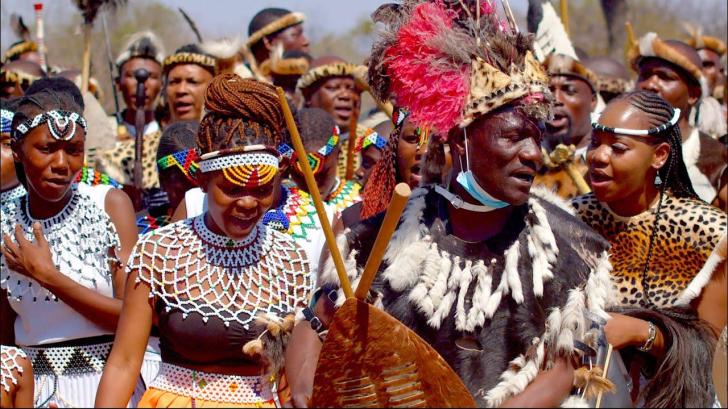News / Local
Mzilikazi commemorations roar into life
05 Sep 2025 at 07:09hrs |
26 Views

The Ndebele Nation in Zimbabwe will this Friday and Saturday commemorate the 157th anniversary of the death of its legendary founding king, Mzilikazi kaMashobane, at Mhlahlandlela, just outside present-day Bulawayo. Mzilikazi, widely revered by his people and even some of his adversaries as a brilliant military strategist and nation-builder, passed away on 9 September 1868 at Inqama near Bulawayo. He was laid to rest in a sacred cave at Entumbane in the Matobo Hills.
Organised by the Mthwakazi kaMzilikazi Cultural Association, this year's commemoration will be held under the theme "Strengthening the Nation Through Culture" at the King Mzilikazi Memorial Site in Mhlahlandlela, located 22km along the Old Gwanda Road. Similar events are also planned in South Africa, the United Kingdom, and the United States.
A descendant of the historically significant Khumalo clan, Mzilikazi rose to prominence as one of the top army commanders under the formidable Zulu King Shaka. In 1822, at the height of the Mfecane—a period of violent upheavals and social disruption across southern Africa—Mzilikazi broke away from Zululand. Despite Shaka's close relationship with him, Mzilikazi faced opposition from Shaka's successor and half-brother Dingane, whom he defeated multiple times.
Mzilikazi's migration northward saw him traverse South Africa, Botswana, and Zambia before settling in the area around present-day Bulawayo in 1840. Along the way, he fought numerous battles, often emerging victorious, and laid the foundation for what would become the Ndebele Nation in Zimbabwe. This nation, now diverse, incorporates the Nguni, Sotho-Tswana, Kalanga, Venda, Shangani, Nambya, and Tonga communities, among others, with some Rozvi/Lozvi descendants also assimilated.
Before settling in Zimbabwe, Mzilikazi had ruled the South African highveld from 1827 to 1837, establishing a strong military state that conquered and absorbed various Sotho-Tswana communities. His ten-year rule in the highveld faced persistent challenges from cattle raids by the Korana and the encroaching Voortrekkers, ultimately compelling him to cross the Limpopo River and enter present-day Zimbabwe. His forces often employed a mix of diplomacy and military action, depending on resistance levels, and integrated conquered peoples into his growing Ndebele nation.
Mzilikazi's leadership style contrasted with that of Shaka. While both were nation-builders, Mzilikazi was seen as more benign, relying on strategic alliances and assimilation alongside raids for resources such as cattle, grain, and soldiers. His son and successor, King Lobengula, continued to consolidate the Ndebele State, retaining the military structures and administrative systems established by Mzilikazi.
The legacy of Mzilikazi remains deeply ingrained in the cultural identity of the Ndebele people, who celebrate him as a foundational figure in Zimbabwe's history. Mzilikazi Day serves not only to honour his leadership and contributions but also to promote the preservation of the country's cultural heritage, traditions, and diversity.
The commemoration underscores the enduring importance of cultural identity in Zimbabwe and recognises the Ndebele Nation's rich history and Mzilikazi's pivotal role in shaping it. The event is a reminder of the nation-building and unifying efforts of one of southern Africa's most remarkable leaders, whose influence continues to be celebrated across Zimbabwe and the wider diaspora.
Organised by the Mthwakazi kaMzilikazi Cultural Association, this year's commemoration will be held under the theme "Strengthening the Nation Through Culture" at the King Mzilikazi Memorial Site in Mhlahlandlela, located 22km along the Old Gwanda Road. Similar events are also planned in South Africa, the United Kingdom, and the United States.
A descendant of the historically significant Khumalo clan, Mzilikazi rose to prominence as one of the top army commanders under the formidable Zulu King Shaka. In 1822, at the height of the Mfecane—a period of violent upheavals and social disruption across southern Africa—Mzilikazi broke away from Zululand. Despite Shaka's close relationship with him, Mzilikazi faced opposition from Shaka's successor and half-brother Dingane, whom he defeated multiple times.
Mzilikazi's migration northward saw him traverse South Africa, Botswana, and Zambia before settling in the area around present-day Bulawayo in 1840. Along the way, he fought numerous battles, often emerging victorious, and laid the foundation for what would become the Ndebele Nation in Zimbabwe. This nation, now diverse, incorporates the Nguni, Sotho-Tswana, Kalanga, Venda, Shangani, Nambya, and Tonga communities, among others, with some Rozvi/Lozvi descendants also assimilated.
Before settling in Zimbabwe, Mzilikazi had ruled the South African highveld from 1827 to 1837, establishing a strong military state that conquered and absorbed various Sotho-Tswana communities. His ten-year rule in the highveld faced persistent challenges from cattle raids by the Korana and the encroaching Voortrekkers, ultimately compelling him to cross the Limpopo River and enter present-day Zimbabwe. His forces often employed a mix of diplomacy and military action, depending on resistance levels, and integrated conquered peoples into his growing Ndebele nation.
Mzilikazi's leadership style contrasted with that of Shaka. While both were nation-builders, Mzilikazi was seen as more benign, relying on strategic alliances and assimilation alongside raids for resources such as cattle, grain, and soldiers. His son and successor, King Lobengula, continued to consolidate the Ndebele State, retaining the military structures and administrative systems established by Mzilikazi.
The legacy of Mzilikazi remains deeply ingrained in the cultural identity of the Ndebele people, who celebrate him as a foundational figure in Zimbabwe's history. Mzilikazi Day serves not only to honour his leadership and contributions but also to promote the preservation of the country's cultural heritage, traditions, and diversity.
The commemoration underscores the enduring importance of cultural identity in Zimbabwe and recognises the Ndebele Nation's rich history and Mzilikazi's pivotal role in shaping it. The event is a reminder of the nation-building and unifying efforts of one of southern Africa's most remarkable leaders, whose influence continues to be celebrated across Zimbabwe and the wider diaspora.
Source - businessdaily.co.zw
Join the discussion
Loading comments…




































